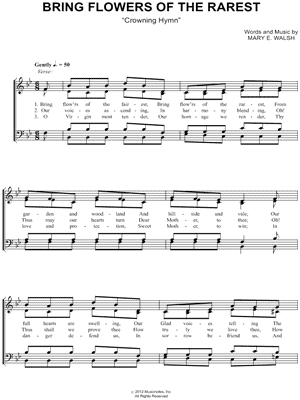As well as the traditional hymnal version, there is an alternative set of lyrics which are particularly popular in Ireland. This version has less-serious words for the 2nd and 3rd verses, and reflects the joy and happiness of May-Day celebrations. The author is unknown, though some sources attribute it to an un-named Sister of Notre Dame.
Downloads
This section may contain affiliate links: I earn from qualifying purchases on these. Free downloads are provided where possible (eg for public domain items).Traditional version
Alternative version
Examples
Singer with band, professional recording
Choir with orchestra, professional recording
Choir with backing track
Instrumental version, on guitar
Lyrics
Traditional version
Bring flowers of the rarestBring blossoms the fairest,
From garden and woodland and hillside and dale;
Our full hearts are swelling,
Our glad voices telling
The praise of the loveliest flower of the vale!
Chorus:
O Mary we crown thee with blossoms today!
Queen of the Angels and Queen of the May.
O Mary we crown thee with blossoms today,
Queen of the Angels and Queen of the May.
Our voices ascending,
In harmony blending,
Oh, thus may our hearts turn
Dear Mother, to thee.
Oh, thus shall we prove thee
How truly we love thee.
How dark, without Mary,
Life's journey would be.
O Virgin most tender,
Our homage we render,
Thy love and protection,
Sweet Mother, to win.
In danger defend us,
In sorrow befriend us,
And shield our hearts
From contagion and sin.
Of mothers, the dearest,
Oh, wilt thou be nearest,
When life with temptation
Is darkly replete.
Forsake us, O never,
Our hearts be they ever,
As pure as the lilies
We lay at thy feet.
Alternative version
Bring flowers of the rarest
Bring blossoms the fairest,
From garden and woodland and hillside and dale;
Our full hearts are swelling,
Our glad voices telling
The praise of the loveliest flower of the vale!
Chorus:
O Mary we crown thee with blossoms today!
Queen of the Angels and Queen of the May.
O Mary we crown thee with blossoms today,
Queen of the Angels and Queen of the May.
Their lady they name thee,
Their mistress proclaim thee,
Ah, grant that thy children on earth be as true.
As long as the bowers
Are radiant with flowers,
As long as the azure shall keep its bright hue.
Sing gaily in chorus;
The bright angels o'er us
Re-echo the strains we begin upon earth;
Their harps are repeating
The notes of our greeting,
For Mary herself is the cause of our mirth.
Bring blossoms the fairest,
From garden and woodland and hillside and dale;
Our full hearts are swelling,
Our glad voices telling
The praise of the loveliest flower of the vale!
Chorus:
O Mary we crown thee with blossoms today!
Queen of the Angels and Queen of the May.
O Mary we crown thee with blossoms today,
Queen of the Angels and Queen of the May.
Their lady they name thee,
Their mistress proclaim thee,
Ah, grant that thy children on earth be as true.
As long as the bowers
Are radiant with flowers,
As long as the azure shall keep its bright hue.
Sing gaily in chorus;
The bright angels o'er us
Re-echo the strains we begin upon earth;
Their harps are repeating
The notes of our greeting,
For Mary herself is the cause of our mirth.




Written by Fr. Sidney McCuen
ReplyDeleteHi Maria, thanks for commenting.
ReplyDeleteFr Sydney MacEwan certainly did sing a number of hymns, including Queen of the May. But I haven't found any evidence that he actually wrote any. Have you got a reference to any evidence about his writings?
I much prefer the more joyful lyrics sung in Ireland - "As long as the bowers are radiant with flowers, as long as the azure shall keep its bright hue".
ReplyDelete...that's the end of verse 2 - will be using this for my Recess hymn this Sunday.
DeleteI have never heard that first version. It must be very old. In Liverpool we always sing the beautiful second version. I am nearly 70 and have never ever even seen the words of that so called 'traditional' hymn, and I have sung this since childhood.
ReplyDelete